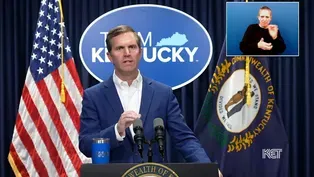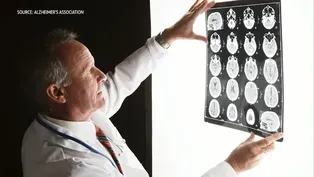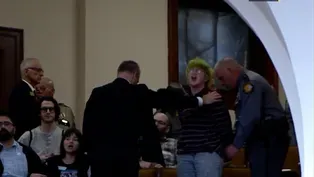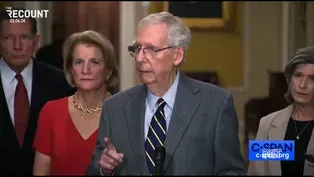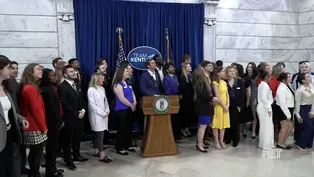
Open Records Act
Clip: Season 2 Episode 201 | 3m 16sVideo has Closed Captions
Opponents of a bill say it erodes Kentucky's Open Records Act.
A state lawmaker says he supports the public's right to a transparent, open government, but opponents of his bill say it erodes Kentucky's Open Records Act in the name of personal privacy.
Problems with Closed Captions? Closed Captioning Feedback
Problems with Closed Captions? Closed Captioning Feedback
Kentucky Edition is a local public television program presented by KET

Open Records Act
Clip: Season 2 Episode 201 | 3m 16sVideo has Closed Captions
A state lawmaker says he supports the public's right to a transparent, open government, but opponents of his bill say it erodes Kentucky's Open Records Act in the name of personal privacy.
Problems with Closed Captions? Closed Captioning Feedback
How to Watch Kentucky Edition
Kentucky Edition is available to stream on pbs.org and the free PBS App, available on iPhone, Apple TV, Android TV, Android smartphones, Amazon Fire TV, Amazon Fire Tablet, Roku, Samsung Smart TV, and Vizio.
Providing Support for PBS.org
Learn Moreabout PBS online sponsorshipA state lawmaker says he supports the public's right to a transparent, open government.
But at what cost to the people who run state government?
As Kentucky Edition's June Lefler reports, a bill would chip away at Kentucky's Open Records Act in the name of personal privacy for public employees and officials.
Requesting public records is a bit of a fishing expedition.
Requests can shed light on what our government is up to.
But a Jefferson County Republican says it can catch much more than that, including the personal details of public servants lives.
The subject, probably almost a half a million people in this state that either worked for a public agency or unpaid board volunteers do this kind of scrutiny on their personal life is crossing the line.
House Bill 509 says only emails from official accounts could be searched, not private emails, and public workers and officials would face consequences if they do conduct the public's business through their private emails.
Transparency, Safeguard.
But the same doesn't apply to text messages, and not every public servant has a work or board issued cell phone.
I think it's laudable that this bill says if you have a public e-mail account, you shouldn't privately email.
However, it doesn't say you shouldn't text on a private device about public business.
I understand the concerns and I think we can work through them.
But the answer can't be.
No text message is ever available and no personal e-mails ever available, because that's the only thing people will choose to communicate and the public will pay the price.
Jefferson County Democrat agrees.
A public record is a public record regardless of where it is stored.
But this bill proceeds from the false belief that public business is not the public's business.
The Kentucky Open Government Coalition and the Kentucky Press Association oppose the bill.
We have a number of member organizations who've tried to get information out of JCPenney's about what happened during the epic meltdown of busing and the first few days of the school year.
We requested emails on all records and they came back and told us, Oh, we only have like two emails because the superintendent, the transportation director and everybody else has been texting throughout this whole thing.
But under this bill, we would not have the right to see what employees were texting each other during the JCPenney's meltdown.
We think that's a loophole that that can be and should be plugged.
The bill's sponsors says not everything should be considered of the public's interest.
You know, in this open records law was passed in the 1970s.
People had verbal conversations that, of course, were not disclosed, but they had telephone conversations were not disclosed.
But they might have had, you know, a scrap of paper that they threw in the trash can that was not disclosed.
All those have been supplanted in our modern era by text messages and emails.
And I think we've got to have an environment where people can have a discussion, ask a question, say, hey, what time's the committee meeting without everything being laid bare and subject to a search?
House Bill 509 passed in the House State Government Committee.
The vote was partizan, with all Democrats opposing the measure.
For Kentucky Edition, I'm June Leffler.
Kentucky's General Assembly enacted the Open Records Act in 1976.
Two years before that came.
The Open Meetings Act, which says any meeting of a public body that meets a quorum is open to the public.
Video has Closed Captions
Governor Andy Beshear is asked about DEI programs and the idea behind them. (1m 55s)
Video has Closed Captions
A look at Frontotemporal Dementia, a common form of dementia in people under 65. (3m 50s)
Disrupting Legislative Process
Video has Closed Captions
New bill could mean new charges for those who interfere with the legislative process. (2m 23s)
Video has Closed Captions
A new bill in the Kentucky State Senate would allow part-time students in K-12 schools. (3m 30s)
McConnell on Trump Endorsement
Video has Closed Captions
U.S. Senator McConnell explains his decision to endorse Donald Trump for the presidency. (1m 48s)
Video has Closed Captions
Getting student rowdiness on school buses under control is the goal of House Bill 446. (3m 15s)
Video has Closed Captions
Student body presidents spoke with lawmakers about issues important to college students. (2m 52s)
Providing Support for PBS.org
Learn Moreabout PBS online sponsorshipSupport for PBS provided by:
Kentucky Edition is a local public television program presented by KET
